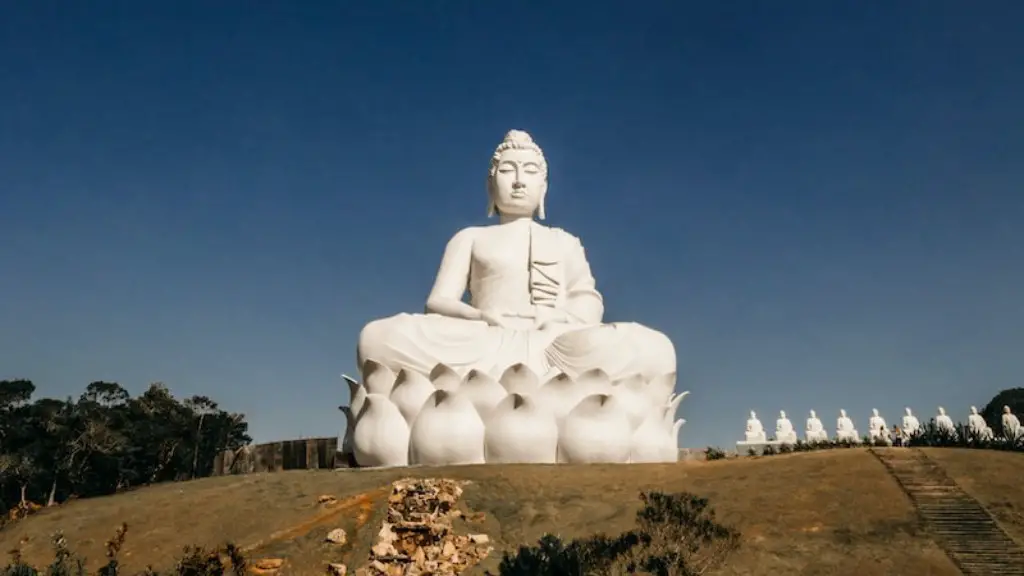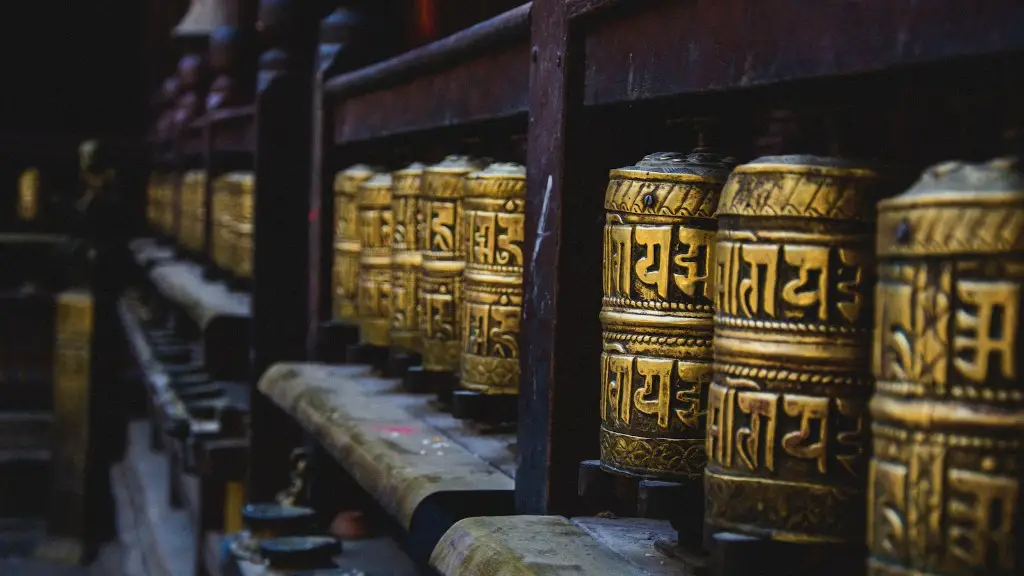Buddhism is a religion that is based on the teachings of Siddhartha Gautama, who is also known as the Buddha. The Buddha was born in India in the 6th century BC and he preached the Middle Way, which is a path of moderation between the extremes of self-indulgence and self-mortification. Buddhism teaches that the way to end suffering is to live a life of compassion and love. The Buddha also taught the Four Noble Truths, which are that suffering exists, that it has a cause, that it can be ended, and that there is a path to ending suffering.
There is no one answer to this question as different people may have different opinions on it. Some may believe that there is a god in Buddhism, while others may not. It is ultimately up to the individual to decide what they believe.
What is god called in Buddhism?
Buddhist teachings state that there are divine beings called devas (sometimes translated as ‘gods’) and other Buddhist deities, heavens, and rebirths in its doctrine of saṃsāra, or cyclical rebirth. However, these beings are not eternal or omnipotent, and are subject to the same suffering as all other beings in saṃsāra.
Buddhism is a tradition focused on spiritual liberation, not a theistic religion. The Buddha himself rejected the idea of a creator god, and Buddhist philosophers have even argued that belief in an eternal god is nothing but a distraction for humans seeking enlightenment.
Do Buddhists believe in heaven
In Buddhism, there is no concept of punishment or reward. There is no divine being who decides who goes to hell or heaven. There is merely the illusory results of our thought, words and deeds, which we call karma.
There are some high level Buddhists who have drawn analogies between Jesus and Buddhism. For example, in 2001, the Dalai Lama stated that “Jesus Christ also lived previous lives”, and added that “So, you see, he reached a high state, either as a Bodhisattva, or an enlightened person, through Buddhist practice or something like that”. Thich Nhat Hanh, a well-known Buddhist teacher, has also said that Jesus is a Buddha.
There are many similarities between the two religions, such as the emphasis on love, compassion, and forgiveness. However, there are also some significant differences, such as the belief in reincarnation in Buddhism.
Ultimately, whether or not one believes that Jesus and Buddha are the same depends on one’s own religious beliefs. However, it is interesting to consider the similarities and differences between the two religions.
Do Buddhists believe in afterlife?
According to Buddhist teaching, life and death are a continuum. Consciousness (the spirit) continues after death and may be reborn. Death can be an opportunity for liberation from the cycle of life, death and rebirth.
Buddhism does not believe in any personal God or any Supreme Being, and instead believes that evil elements defile the mind and have a deadening effect on the psyche, making it difficult for the mind to be uplifted.
Who are the 3 gods of Buddhism?
The Three Buddhist Deities Vajrapāṇi, Mañjuśrī and Avalokiteśvara are also known as the Three Great Bodhisattvas. They are important figures in Mahayana Buddhism and are often depicted in art and literature.
Vajrapāṇi is the Bodhisattva of Power and is associated with the Thunderbolt Sutra. He is often depicted holding a vajra, or thunderbolt, in his hand.
Mañjuśrī is the Bodhisattva of Wisdom and is associated with the Prajñāpāramitā Sutra. He is often depicted holding a sword in his hand, which symbolizes the cutting of ignorance and delusion.
Avalokiteśvara is the Bodhisattva of Compassion and is associated with the Heart Sutra. He is often depicted holding a lotus flower in his hand, which symbolizes his compassion for all beings.
These are the five sins of this kind:
1. Killing one’s mother
2. Killing one’s father
3. Killing an arhat (saint)
4. Injuring the body of a buddha
5. Causing a division in the Buddhist community
What do Buddhist do after death
Cremation is seen as the preferred choice when a loved one dies in the Buddhist faith because they believe in reincarnation. The physical body holds little significance to them, it is merely a vessel for holding the soul. Buddhists also believe in organ donation as it is seen as a good deed.
Buddhist followers often pray to buddhas, bodhisattvas, and spiritual masters as a way of invoking the enlightened qualities of our own heart and mind. By letting go of the ego’s resistance to humility, we can open ourselves up to these higher states of consciousness. Through prayer, we can connect with our true nature and tap into a deeper wisdom and compassion.
What religions don’t believe in God?
Atheism is simply the lack of belief in a god or gods. It is not a disbelief, as that would imply that the concept of a god has been considered and rejected. Instead, it is simply a lack of belief.
Atheists may also lack belief in other supernatural concepts, such as an afterlife, angels, or demons. However, atheism only refers to the lack of belief in gods.
There is no one atheist worldview, as atheists can (and do) hold a variety of different worldviews. Some atheists are naturalists, believing that the natural world is all that exists. Others may believe in different concepts, such as pantheism (the belief that everything is part of a god) or humanism (the belief that humans are the highest priority).
Atheism is not a religion, as it does not require belief in any supernatural concepts. However, some atheists do organize themselves into groups, such as secular humanist groups, in order to promote their worldview and work for social change.
There is a commonly held modern view that Buddhism is exceptionally compatible with science and reason. Some even go so far as to say that it is a kind of science, perhaps a “science of the mind” or a “scientific religion”.
Did Buddha claim to be God
Throughout history, there have been many different religious leaders and founders. While some of these individuals claimed to be directly inspired by a god or external power, the Buddha was the only one who did not make such a claim. Instead, the Buddha was a human being who taught others about the importance of leading a moral and ethical life. In doing so, he showed that it was possible for anyone to achieve enlightenment and reach a state of nirvana. This message was unique and helped to establish the Buddha as one of the most important religious figures in history.
For Buddhists, karma is a powerful force that extends beyond this life. Bad actions in a previous life can follow a person into their next life and cause bad effects (which Westerners are more likely to interpret as ‘bad luck’). Even an Enlightened One is not exempt from the effects of past karma.
Do Buddhists celebrate Christmas?
Despite what some people may think, many Buddhists do actually celebrate the holiday season. Among Asian American Buddhists, three quarters of them celebrate Christmas. On December 8th, some Buddhists also observe Bodhi Day- which marks when the Buddha reached enlightenment. So even though Buddhists have different religious beliefs than those who celebrate Christmas, that doesn’t mean they can’t still get into the holiday spirit!
Hinduism is one of the world’s oldest religions and is often referred to as “Sanātana Dharma” by practitioners. Hinduism has no single founder, no centralized authority, and no hierarchy. Rather, it is a collection of religious beliefs and practices that have developed over the centuries in the Indian subcontinent. Hinduism is a diverse religion, with a variety of schools and traditions. The word “Hindu” is an exonym, and while Hinduism has been called the oldest religion in the world, many practitioners refer to their religion as Sanātana Dharma (Sanskrit: सनातन धर्
Conclusion
Buddhism does not believe in a personal god, but rather states that the highest truth is without personification.
There is no clear answer to this question as there is no clear definition of god in Buddhism. Some people may say that there is a god in Buddhism, while others may say that there is not. Ultimately, it is up to each individual to decide for themselves what they believe.



